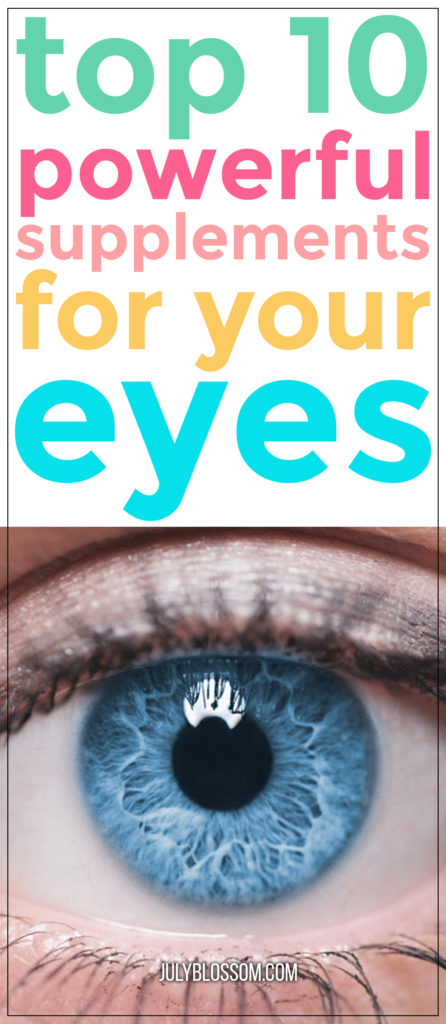As someone who is myopic and have had my share of eye issues such as retinal tears, I am ever keen to stock up on powerful supplements for eye health. What supplements can you take to improve and maintain your good vision and healthy eyes? Read on for the answers.
Give your Eyes Some Nutrient-Filled Love
If you have eye issues, I’m 100% sure you’re always scared about your eye health.
I know I am.
What’s more is you’re always looking for ways to preserve your eye health and prevent it from deteriorating.
The thing is, it’s difficult eating healthy especially if you’re on a busy schedule, which most of us are.
In fact, most weekdays are so filled with work and study that we barely have time to eat a proper meal! Who can relate?!
Most of the times we consume quick prepackaged meals to save time but these meals lack the nutrients we need and deserve for health!
I do try to eat healthy solely for my eyes. I even went an extra mile and invested in supplements for eye health, because that is a guarantee that I’ll be getting daily nutrients needed to protect my vision.
It may not be easy eating right or buying expensive supplements – but you can do it for the sake of your eyes.
Here are top 10 supplements for eye health that safeguard your eyesight and maintain healthy vision.
Top 10 Best Supplements for Eye Health

1. Lutein
Okay, so lutein is by far one of THE best supplements for eye health.
Lutein is a carotenoid that has been shown to have powerful antioxidant properties. It is naturally found in the retina and macula, two eye structures found at the back of the eye.
It protects the eye from free radicals that cause oxidative damage.
This oxidative damage is the one that contributes to age-related eye disorders including macular degeneration and cataracts.
Lutein also filters high-energy blue light from reaching and damaging the eye.
People who take lutein notice improvement in dry eyes, extreme eye strain and also photophobia (sensitivity to sunshine and bright light).
You’ll mostly see lutein sold as a supplement together with zeaxanthin because research shows that lutein and zeaxanthin seem to work better when combined.
Research shows that supplementing with lutein and zeaxanthin slows the formation of cataracts.
- How much you need per day: 10 mg
- What supplement to get: Now Supplements Lutein & Zeanxanthin
2. Zeaxanthin
Zeaxanthin comes from the same family of carotenoids like lutein.
Both lutein and zeaxanthin are dietary carotenoids that accumulate in the retina and the macula.
You’ll mostly see it sold together with lutein in supplement form.
Just like lutein, zeaxanthin neutralizes oxidative damage and shields the eye from high-energy.
Research shows that lutein and zeaxanthin both slow the progression of AMD (age related macular degeneration).
Studies also show that supplementing with lutein and zeaxanthin may help reduce the inflammatory process involved in those with uveitis, an inflammatory condition in the middle layer of the eye.
An animal diabetes study also showed that lutein and zeaxanthin reduce oxidative stress markers that damage the eyes, which can be useful for those with diabetic retinopathy.
- How much you need per day: 2 mg
- What supplement to get: Now Supplements Lutein & Zeanxanthin
3. Omega 3
Omega 3 fatty acids are another important nutrient for eye health.
They are readily available as fish pills, which many people already take for various health benefits.
Omega 3 fatty acids, particular the two types: DHA and EHA, promote adult eyes from premature macular degeneration.
It also promotes visual development and health retinal function.
Supplementing with omega 3 may also help proper drainage of intraocular fluid from the eye hence decreasing the risk of high eye pressure and glaucoma.
Omega 3 deficiency is associated with dry eyes and dry eye syndrome.
So if you have perpetual dry eyes, especially from computer use, or if you are a contact lens wearer with dry eyes, omega 3 can help lubricate your eyes from the inside-out.
- How much you need per day: 1000 mg
- What supplement to get: BioSchwartz Omega 3 Fish Oil Supplement
4. Vitamin A
Next up on this list of best supplements for eye health is Vitamin A.
Vitamin A is very important for healthy vision.
It is a component of the protein rhodopsin, which enables our eyes to see in dim light. According to the AAO (American Academy of Ophthalmology), Vitamin A deficiency can lead to night-blindness, meaning you won’t see properly at night in the dark.
Vitamin A supports the function of the cornea, which is the transparent outer layer protecting the pupil and inner parts of the eye.
It also maintains the functioning of the conjunctival membranes.
If your eyes feel dry and irritated with little moisture to keep them lubricated and smooth, then you can check your Vitamin A levels.
Those with Vitamin A deficiency are highly likely to be affected with dry eyes.
- How much you need per day: 400-700 mcg Retinol Activity Equivalent
- What supplement to get: Bronson Vitamin A 10,000 IU, Non-GMO Formula
5. Vitamin C
It may come as a surprise but did you know that Vitamin C is actually really good for your eyes?
Vitamin C, also known as ascorbic acid, has been shown to cut the risk of cataract progression by a third, according to the American Academy of Ophthalmology.
Supplementing with Vitamin C doesn’t just keep colds away, it also keeps your eyes healthy.
It promotes health blood vessels around the eyes.
This is important because the eye is covered with an intricate network of tiny blood vessels that deliver nutrients to all structures within the eye.
Vitamin C also helps fight off free radical-induced oxidative damage that accelerated premature cataracts and macular degeneration.
- How much you need per day: 500 mg
- What supplement to get: Now Supplements Vitamin C

6. Zinc
Zinc is the top mineral your eye craves.
It helps maintain the health and functioning of the retina, cell membranes and protein structure of the eye.
Zinc also facilitates the movement of Vitamin A from the liver to the retina to produce melanin. Melanin is a pigment that is needed to safeguard the eye from harmful UV light.
Another benefit of supplementing with zinc is that it may help people who have age-related macular degeneration or those with a risk of developing it.
According to the American Optometric Association, taking 40-80 mg of zinc each day, together with other antioxidants could slow the progression of advanced Age-related macular degeneration by 25% and reduce visual acuity loss by 19%.
Zinc deficiency has been linked to impaired vision especially poor night vision, and also cloudy cataracts.
- How much you need per day: 11 mg for men, 8 mg for women and 25+ mg for those with a high risk of age-related macular degeneration. Note: Those supplementing with zinc must take 2mg/day of copper as zinc can interfere with the absorption of copper.
- What supplement to get: Solgar Chelated Zinc
7. Bilberry Extract
Have you ever heard of the story of the WWII British Royal Airforce pilots who supposedly had heightened vision and accurately bombed the enemy after having bilberry jam for tea?
Sounds crazy but that’s the tale folks.
Apparently, that’s how the fruit bilberry gained its reputation for boosts night vision.
Bilberry actually comes from the same family as blueberry. It also resembles blueberries but it has a darker color and a tarter flavor.
Anecdotal evidences shows that glaucoma patients benefit from supplementing with bilberry.
This is because it enhances circulation in blood vessels, which increases the amount of oxygen delivered to the eyes.
The improved circulation in the tiny capillary network reduces blood pressure in the eyes.
According to WebMD, there is a lot of early research that shows that bilberry is good for eye health:
- Taking 60 mg of a bilberry component anthocyanin twice daily for at least 12 months improves vision in glaucoma patients.
- Bilberry might improve eye strain in people who stare at computer screens for work.
- It contains a high amount of a certain chemical, called anthocyanoside, which seems to improve retina problems associated with diabetes.
Caution: Bilberry can interact with aspirin and other products containing ibuprofen and cause blood thinning in people with blood disorders or those taking blood thinning and anti-diabetes medication. It should also not be taken if you are scheduled for a surgery. Consult your doctor before taking bilberry.
- How much you need per day: Take it as directed on the package or as directed by your doctor. Do not use more of this product than is recommended on the label.
- What supplement to get: Bilberry Extract by Puritan’s Pride
8. Gingko Biloba Leaf Extract
Gingko biloba is a supplement useful for glaucoma patients.
Research says that gingko biloba extract has been shown to have antioxidant and vascular effects, making it potentially effective in treating glaucoma.
It also improves blood circulation to the eyes.
Patients were seen to have increased ocular blood flow after administration of ginkgo biloba extract.
Further research also shows that supplementing with gingko biloba and bilberry improved visual function in those with normal tension glaucoma.
- How much you need per day: Ginkgo biloba supplements are usually taken in the range of 40-200 mg per day
- What supplement to get: Nature’s Way GingkGold Eyes, Vision Health Formula
9. Vitamin E
Vitamin E is called the ‘beauty’ vitamin but who knew it’s also on the list of top 10 supplements for eye health?!
According to the American Optometric Association, Vitamin E fights off free radicals that may damage healthy eye tissue through oxidative stress.
Vitamin E has also been associated with a decrease in the risk of cataract progression.
Many people take Vitamin E for wrinkle-free skin. But it also has anti-aging effects on your eyes!
So if you already take Vitamin E for beauty, know that your eyes are also greatly benefitting ;).
- How much you need per day: 400 IU
- What supplement to get: Nature Made Vitamin E
10. B-Vitamins
Last but not least on this list of best supplements for eye health is none other than B-vitamins.
Research shows that daily supplementation with folic acid, Vitamin B6 and Vitamin B12 may reduce the risk of AMD (age-related macular degeneration) which is the leading cause of severe irreversible vision loss in older Americans.
Lower nutrient intake of a Vitamin B3, niacin was associated with glaucoma according to this 2018 nation-wide study carried out in South Korea.
An early piece of research looked at the link between nutrient intake and eye health among 2,900 people between the ages of 49 and 97 years.
The results showed that higher intakes of nutrients such as protein, Vitamin A and the B-vitamins niacin, thiamine and riboflavin were associated with a lower rate of nuclear cataracts.
- How much you need per day: The recommended daily amount of each B vitamin varies. If you are to use a B-vitamin supplement, take it as directed on the package or as directed by your doctor.
- What supplement to get: Super B Complex Vitamins
You have reached the end of this article, ‘Top 10 Supplements for Eye Health.’ Thank you for reading. Please share with your loved ones.









Leave a Reply